结构化查询语言(SQL)基础语法习题——数据库查询(DQL)、数据库操作(DML)、建立视图(View)
目录
- 1 数据库查询(DQL)语句练习
- 1.1 查询顾客表中所有不重复的城市
- 1.2 在产品表中找出库存量小于订购量的产品信息
- 1.3 查找产品表中再次订购量大于15的产品信息
- 1.4 查找产品表中再次订购量大于等于10且修订量大于订货数量的产品信息
- 1.5 根据运费查询订单信息
- 1.6 查询国家为Mexico、Germany的客户数量
- 1.7 在顾客表中找出不是特定城市的顾客信息
- 1.8 查找产品表中最低的单价
- 1.9 查找订单表中每位顾客的平均运费
- 1.10 查找产品表中平均订购数大于特定值的产品信息
- 1.11 在订单详细信息表中查找包含产品种类数超过特定值的订单信息
- 1.12 统计各个供应商及其供应情况
- 1.13 查询客户的订单情况
- 1.14 查找每位领导的直接下属数量 ⭐️
- 1.15 查询特定订单的详细信息
- 1.16 查找订单数最多的员工信息 ⭐️
- 2 数据库操作(DML)语句练习
- 3 视图练习
1 数据库查询(DQL)语句练习
1.1 查询顾客表中所有不重复的城市
查询出顾客表(customers)中所有不重复的所在城市(City)
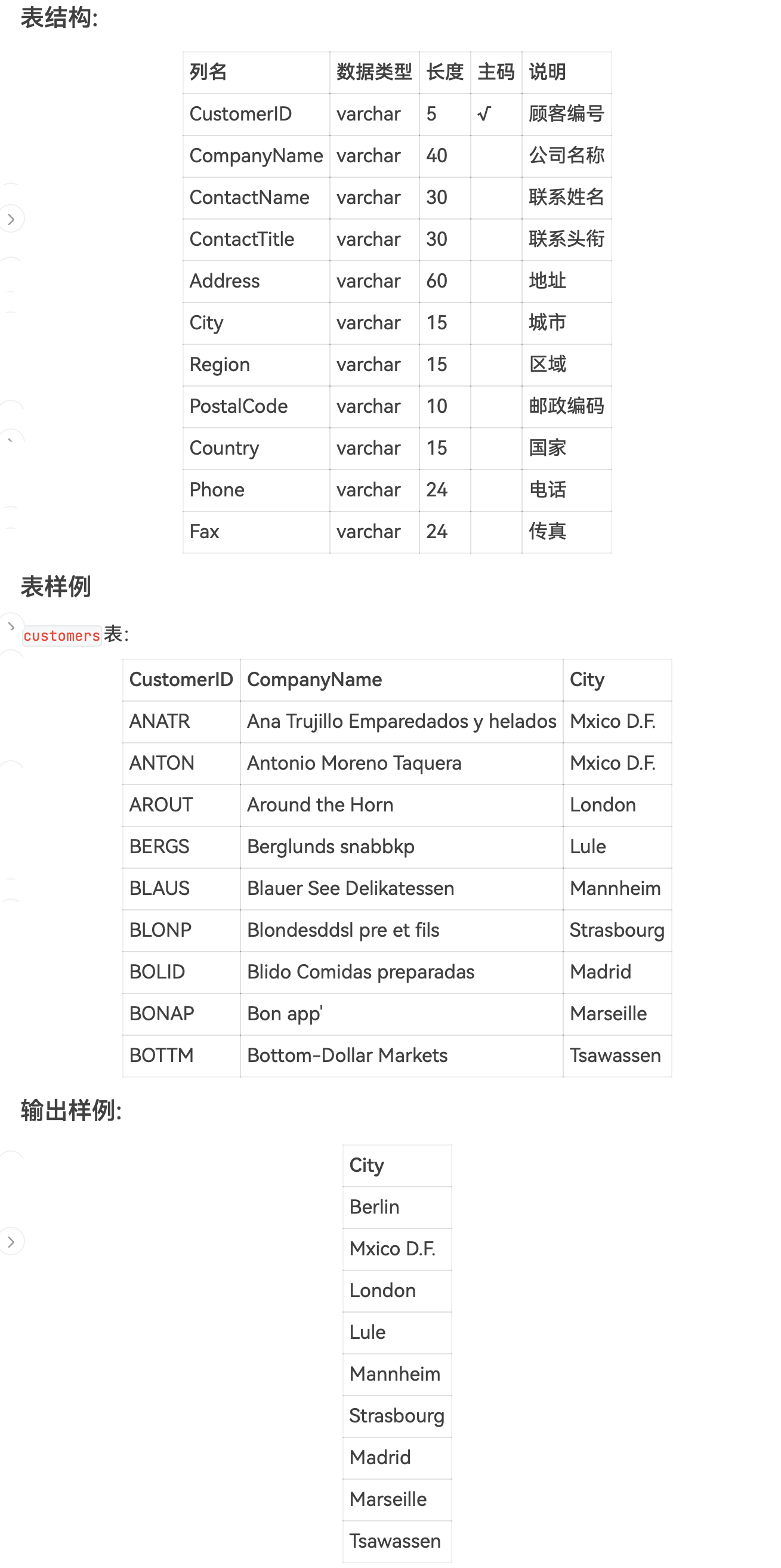
select distinct City from customers;1.2 在产品表中找出库存量小于订购量的产品信息
在产品表(products)中找出库存量(UnitsInStock)小于订购量(UnitsOnOrder)的产品的产品编号(ProductID)和产品名称(ProductName)
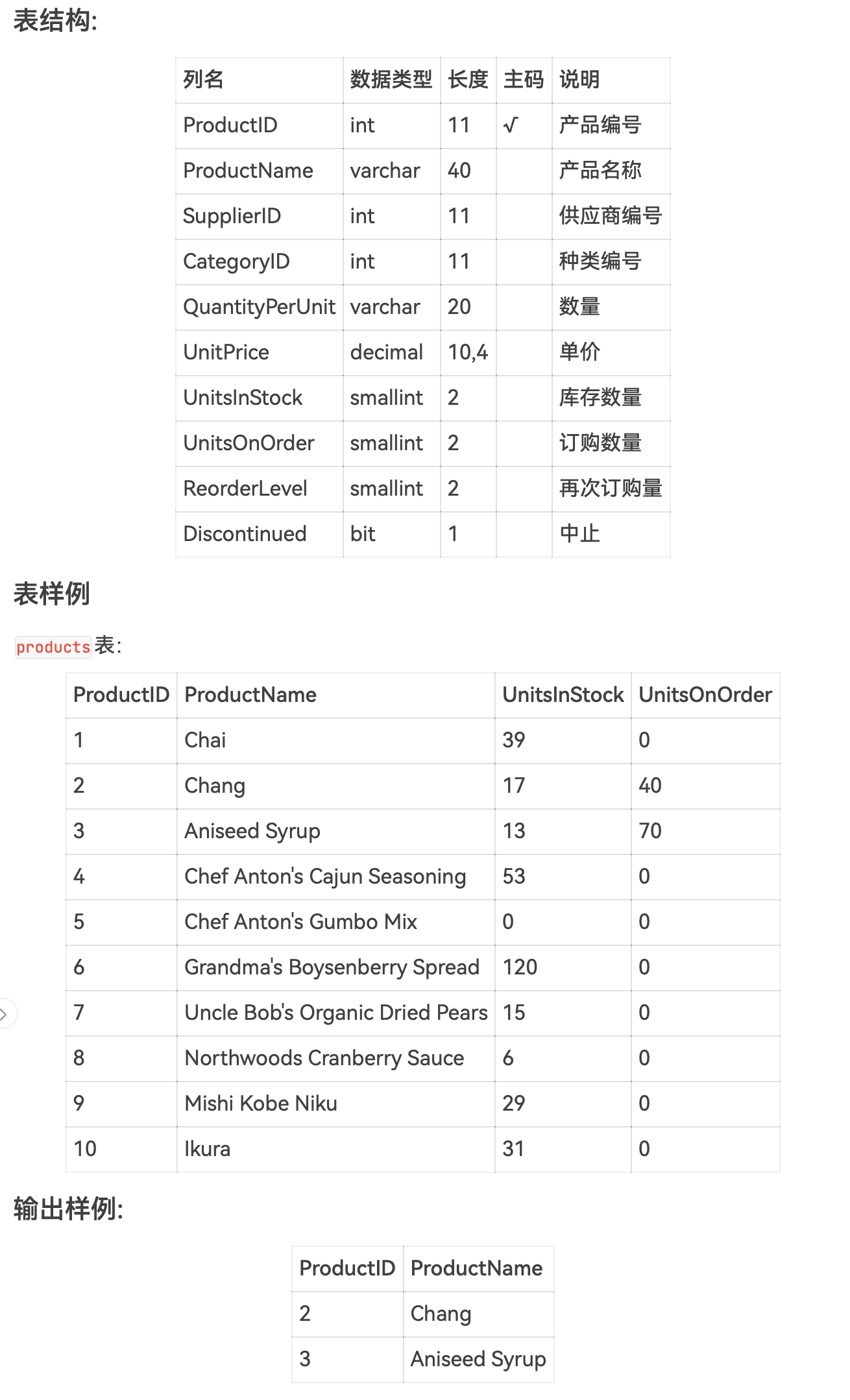
select ProductID, ProductName
from products
where UnitsInStock < UnitsOnOrder;1.3 查找产品表中再次订购量大于15的产品信息
在产品表(products)中找出再次订购量(ReorderLevel)大于15的产品的产品编号(ProductID),产品名称(ProductName)和供货商编号(SupplierID)
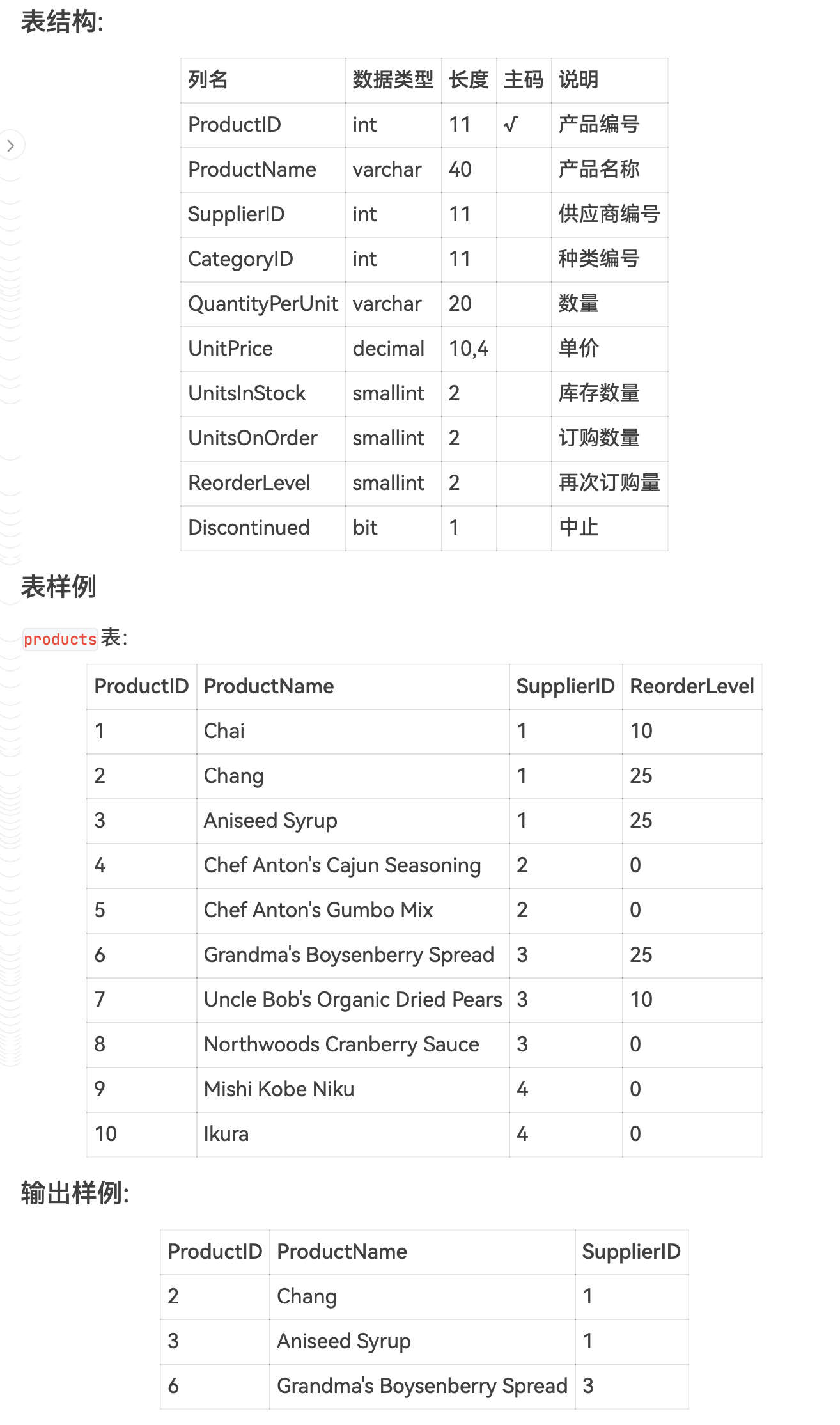
select ProductID, ProductName, SupplierID
from products
where ReorderLevel > 15;1.4 查找产品表中再次订购量大于等于10且修订量大于订货数量的产品信息
在产品表(products)中找出再次订购量(ReorderLevel)大于等于10,且再次订购量(ReorderLevel)大于订购数量(UnitsOnOrder)的产品的产品编号(ProductID),产品名称(ProductName)和供货商编号(SupplierID)
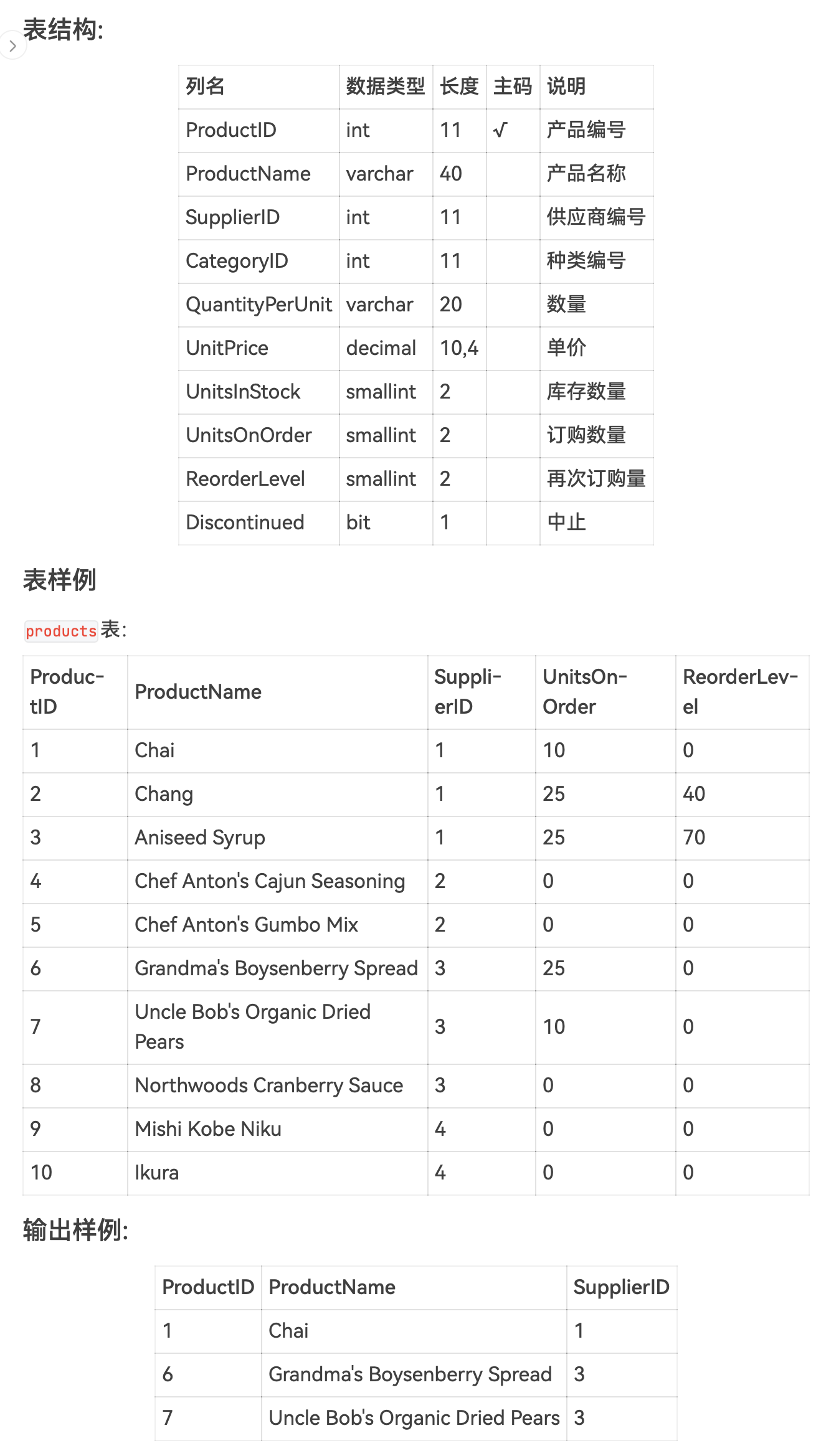
select ProductID, ProductName, SupplierID
from products
where ReorderLevel >= 10 and ReorderLevel > UnitsOnOrder;1.5 根据运费查询订单信息
在订单表(orders)中找出运费(Freight)在10到50之间的订单编号(orderid)、顾客编号(customerid)和职员编号(employeeid)

select orderid, customerid, employeeid
from orders
where Freight between 10 and 50;1.6 查询国家为Mexico、Germany的客户数量
查询出顾客表(customers)中查询国家(Country)为Mexico、Germany的客户数量,并重命名为custCount
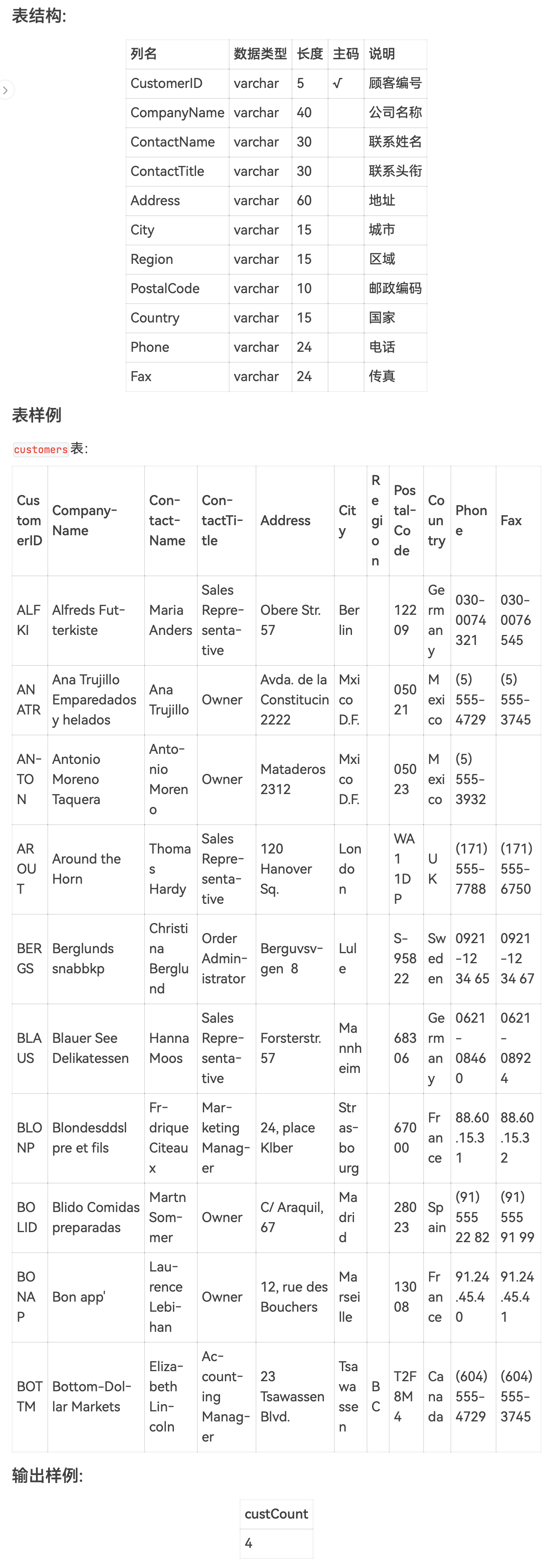
select count(*) custCount
from customers
where Country in ('Mexico', 'Germany');1.7 在顾客表中找出不是特定城市的顾客信息
在顾客表(customers)中找出所在城市(City)不是Madrid、Torino和Paris的顾客编号(CustomerID)及电话(Phone)
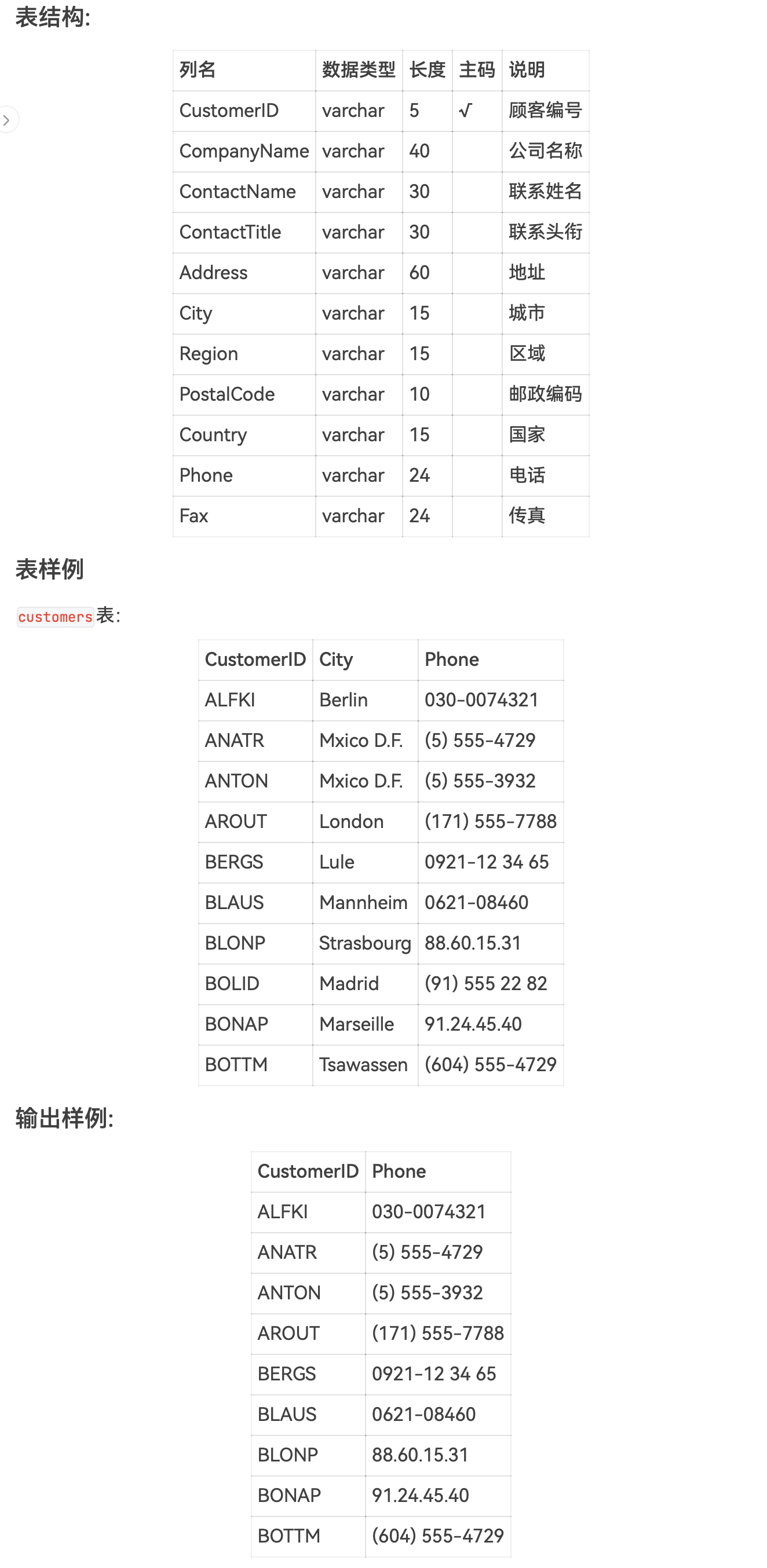
select CustomerID, Phone
from customers
where City not in ("Madrid", "Torino", "Paris");1.8 查找产品表中最低的单价
在产品表(products)中查询最低的单价(UnitPrice),并重命名为minUnitPrice
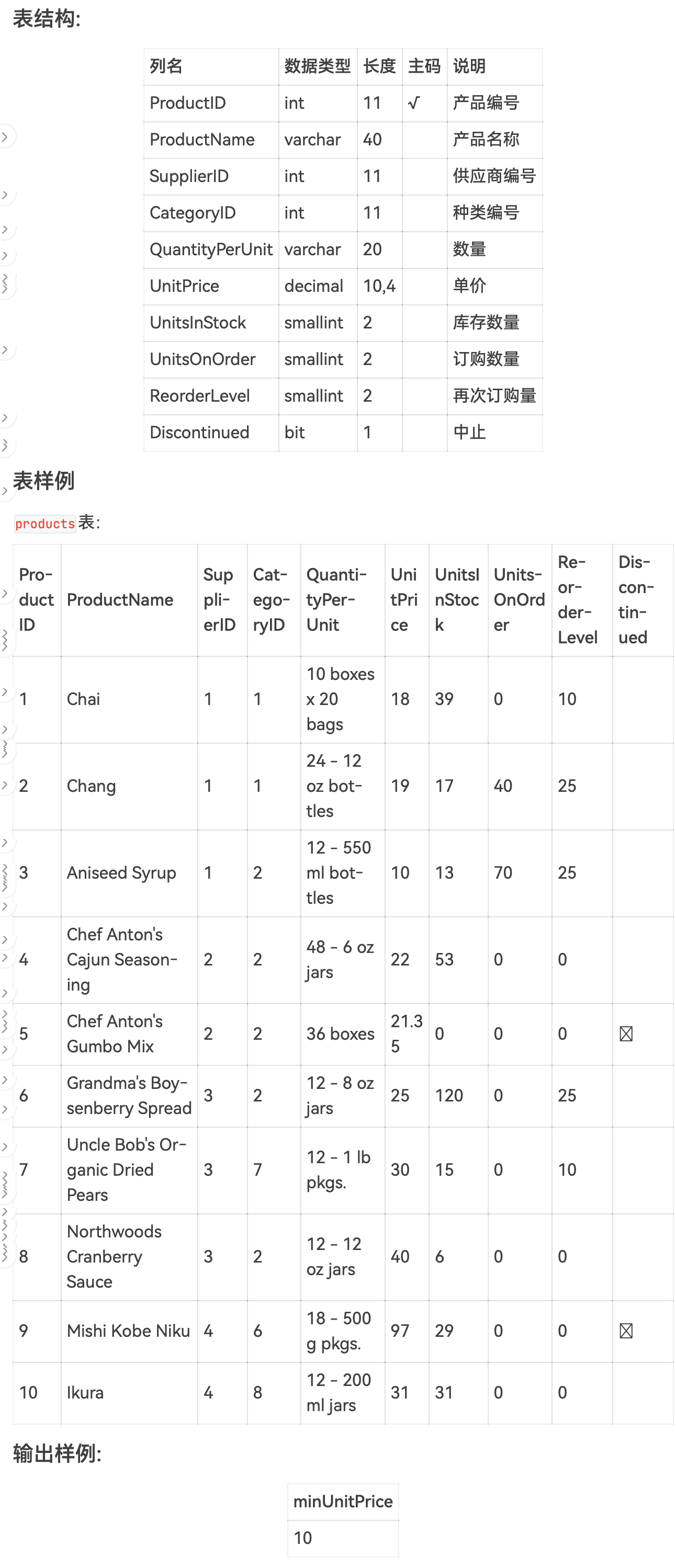
select min(UnitPrice) minUnitPrice
from products;1.9 查找订单表中每位顾客的平均运费
查询订单表(orders)中每位顾客的平均运费,结果显示为顾客编号(CustomerID)和平均运费(avgFreight)

select CustomerID, avg(Freight) avgFreight
from orders
group by CustomerID;1.10 查找产品表中平均订购数大于特定值的产品信息
在产品表(products)中查找平均订购数量大于15的产品信息,显示为:产品编号(ProductID),和总订货数量(重命名为sumUnitsOnOrder)
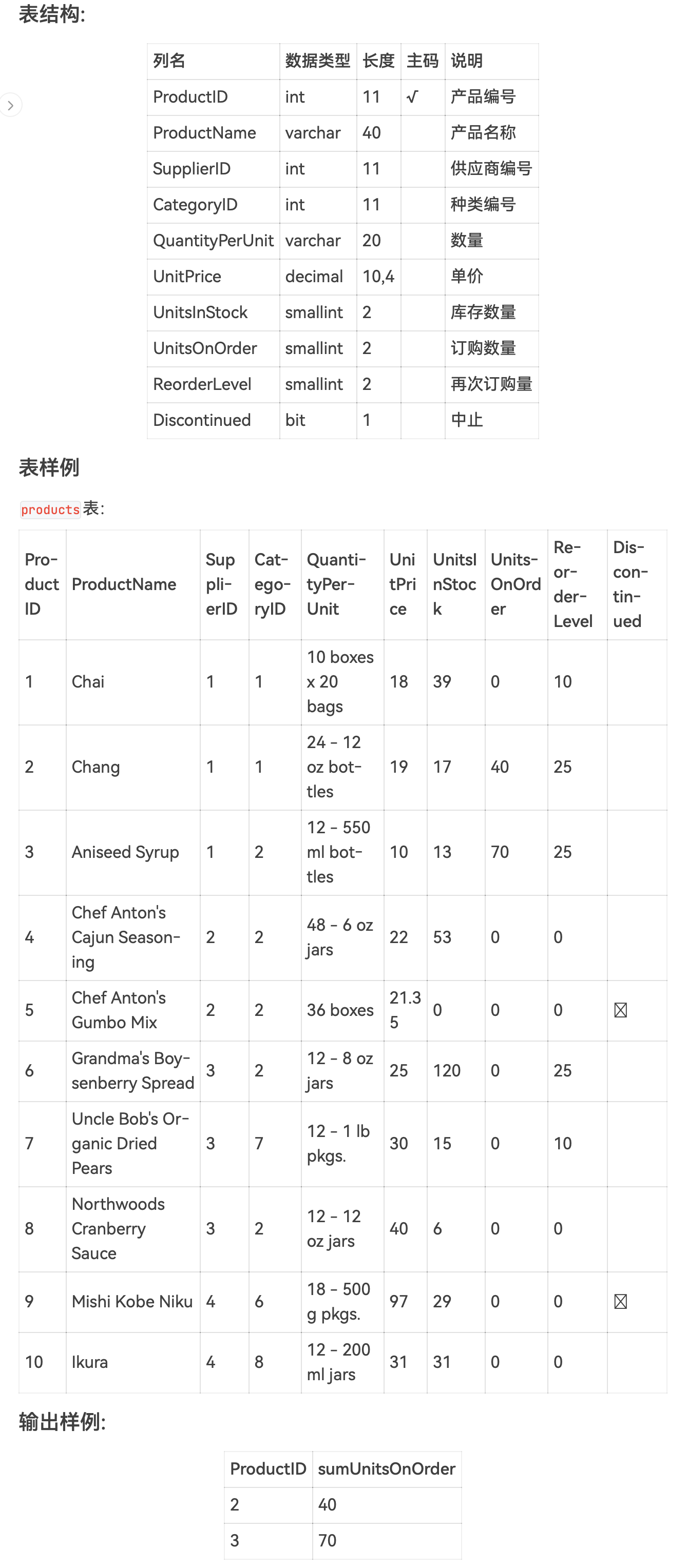
select ProductID, sum(UnitsOnOrder) sumUnitsOnOrder
from products
group by ProductID
having avg(UnitsOnOrder) > 15;1.11 在订单详细信息表中查找包含产品种类数超过特定值的订单信息
在订单详情表(orderdetails)中查找订单中包含的不同产品的个数超过2的订单信息,显示订单号(OrderID)和总数量(重命名为totalQuantity)
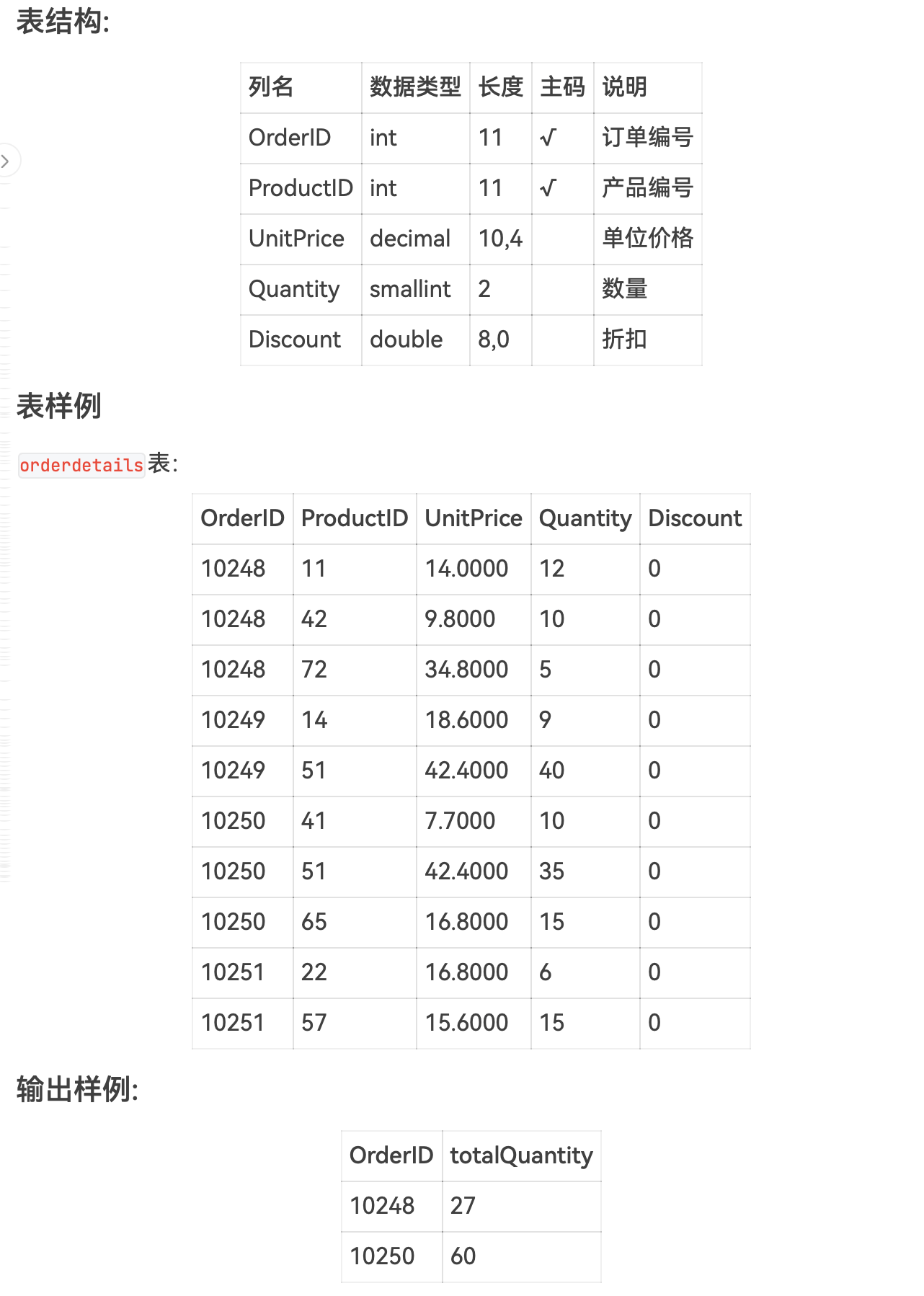
select OrderID, sum(Quantity) totalQuantity
from orderdetails
group by OrderID
having count(distinct ProductID) > 2;1.12 统计各个供应商及其供应情况
统计各个国家(Country)的供应商的供应产品情况,显示为:国家(Country),库存总量(重命名为sumUnitsInStock),平均单价(重命名为avgUnitPrice)

select Country, sum(UnitsInStock) sumUnitsInStock, avg(UnitPrice) avgUnitPrice
from suppliers
join products on suppliers.SupplierID = products.SupplierID
group by Country;1.13 查询客户的订单情况
查找客户的订单情况,显示为:顾客编号(CustomerID) ,公司名称(CompanyName),订单编号(OrderID),员工编号(EmployeeID)

select o.CustomerID, c.CompanyName, o.OrderID, o.EmployeeID
from orders o, customers c
where c.CustomerID = o.CustomerID1.14 查找每位领导的直接下属数量 ⭐️
查询每位领导的直接下属数量,显示:领导的员工编号(EmployeeID),下属数量(重命名为countSub)
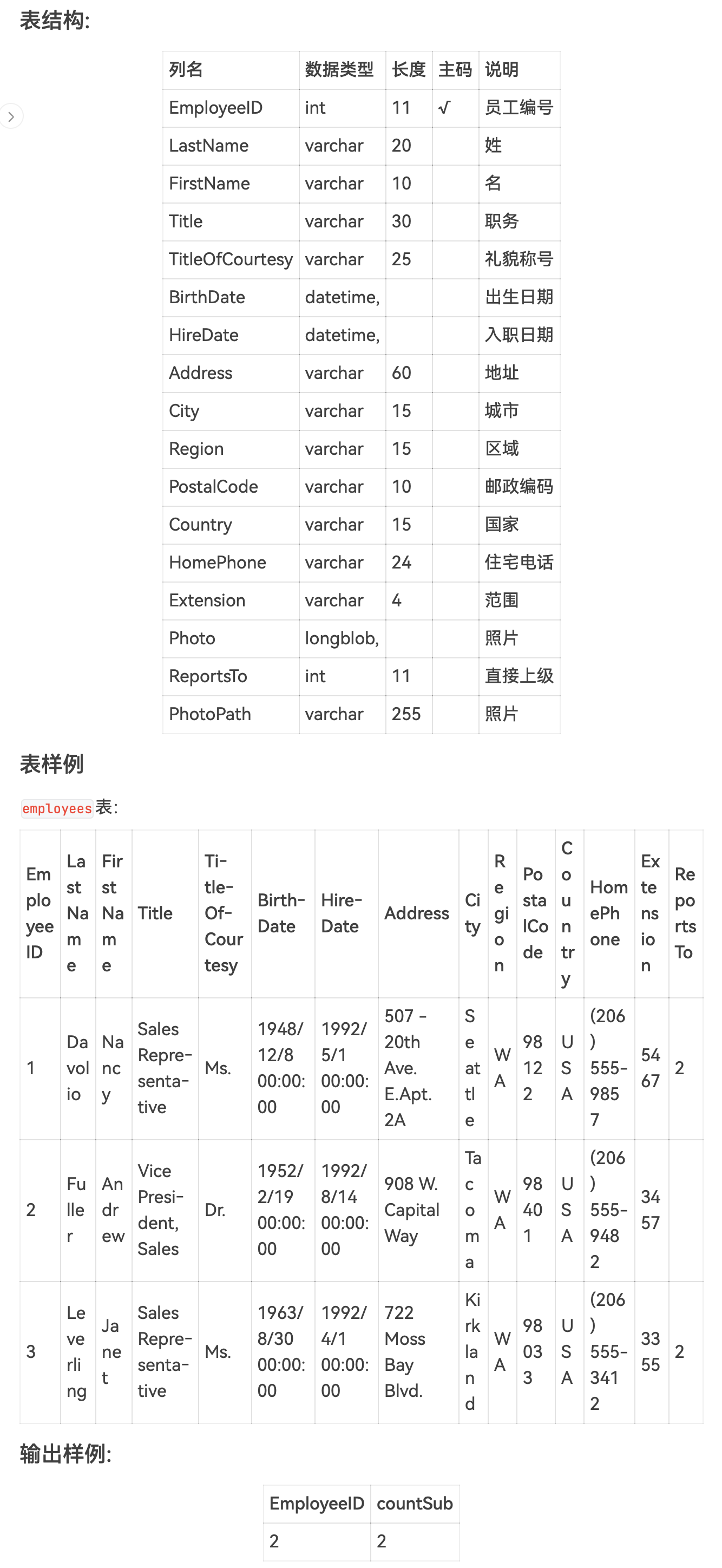
select e.ReportsTo EmployeeID, count(e.EmployeeID) countSub
from employees e
where e.ReportsTo is not null
group by e.ReportsTo;1.15 查询特定订单的详细信息
查找城市(City)是Madrid的顾客,所下的订单详细信息,显示为:顾客编号(CustomerID),公司名称(CompanyName),订单编号(OrderID),产品编号(ProductID)

select o.CustomerID, c.CompanyName, o.OrderID, od.ProductID
from orders o, orderdetails od, customers c
where o.OrderID = od.OrderID and o.CustomerID = c.CustomerID and c.City = "Madrid"1.16 查找订单数最多的员工信息 ⭐️
查找订单数最多的员工信息,显示为:姓(LastName),名(FirstName)和职务(Title)

select e.LastName, e.FirstName, e.Title
from employees e, orders o
where e.EmployeeID = o.EmployeeID
group by e.EmployeeID
order by count(o.CustomerID) desc
limit 1;2 数据库操作(DML)语句练习
2.1 新增一个区域
在区域表(region)中添加一条记录:区域编号(RegionID)为5,区域描述(RegionDescription)为Center
提示:请使用INSERT语句作答。
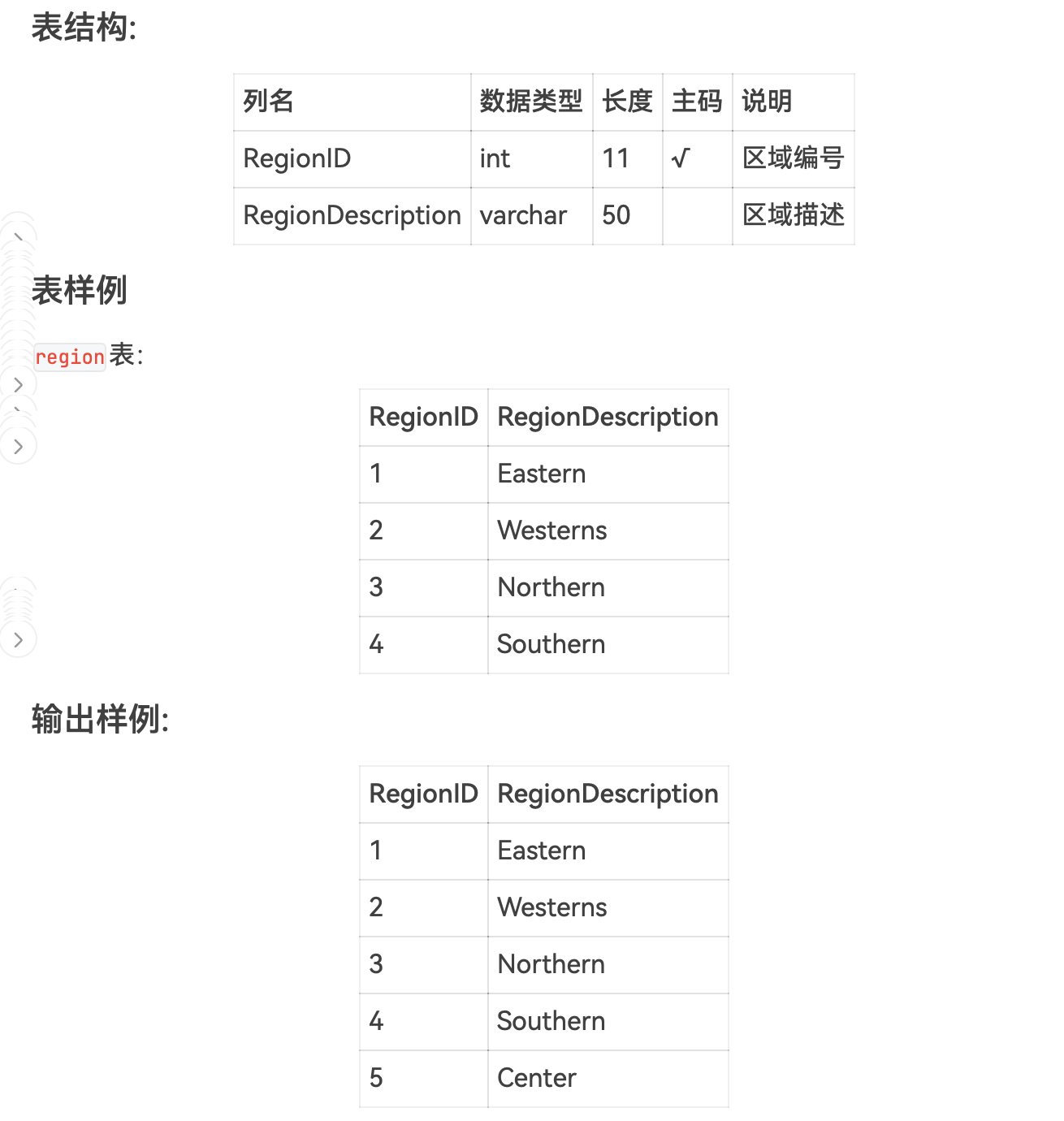
insert into region(RegionID, RegionDescription)
values (5, "Center");2.2 新增订单统计信息
统计订单表(orders)中顾客的订单数量,并插入results表中
提示:请使用INSERT语句作答。

insert into results (CustomerID, OrderCount)
select CustomerID, count(OrderID) OrderCount
from orders
group by CustomerID;2.3 根据运费调整订单单价
对于运费(Freight)超过30.00的订单,将其相关的订单详情表(orderdetails)中产品的单价(UnitPrice)提高15%
提示:请使用UPDATE语句作答。

update orderdetails od
set UnitPrice = UnitPrice * 1.15
where (
select o.Freight
from orders o
where od.OrderID = o.OrderID
);2.4 删除特定城市的顾客信息
删除顾客表(customers)中城市(City)为London的顾客信息
提示:请使用DELETE语句作答。

delete from customers
where City = "London";3 视图练习
3.1 建立供应商的销售记录视图vSupStatics
本题要求编写SQL语句,建立供应商的销售记录视图vSupStatics,显示供应商号和订单数量,订单总价,分别表示为Sid,ordcount,ordtotalPrice。
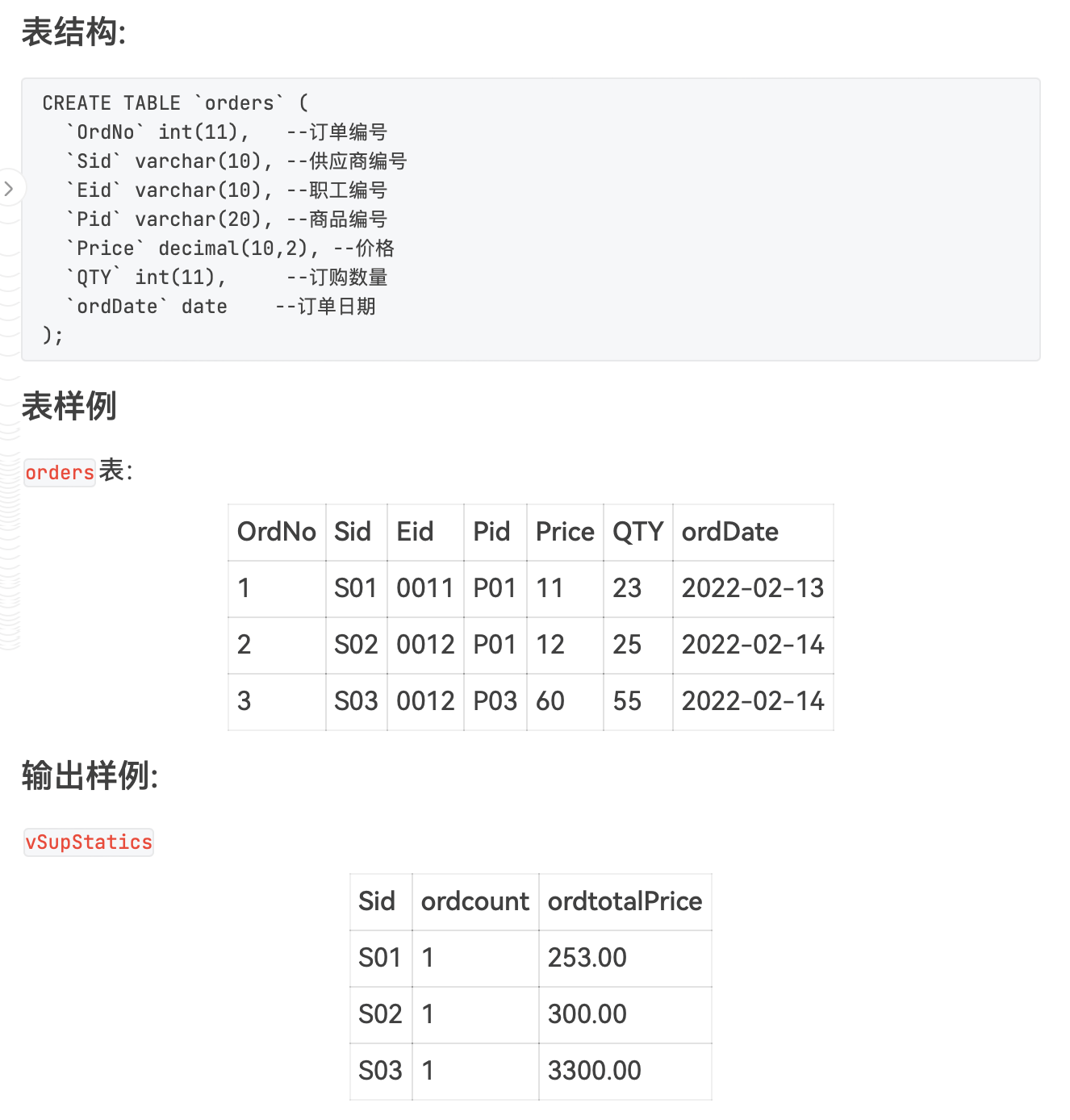
create view vSupStatics as
select Sid, count(OrdNo) ordcount, sum(Price * QTY) ordtotalPrice
from orders
group by Sid;3.2 建立产品的销售记录视图vProductStatics
本题要求编写SQL语句,建立产品的销售记录视图vProductStatics,显示产品编号,销售总数量,最高价,最低价,分别表示为Pid,totalQTY,maxPrice,minPrice。
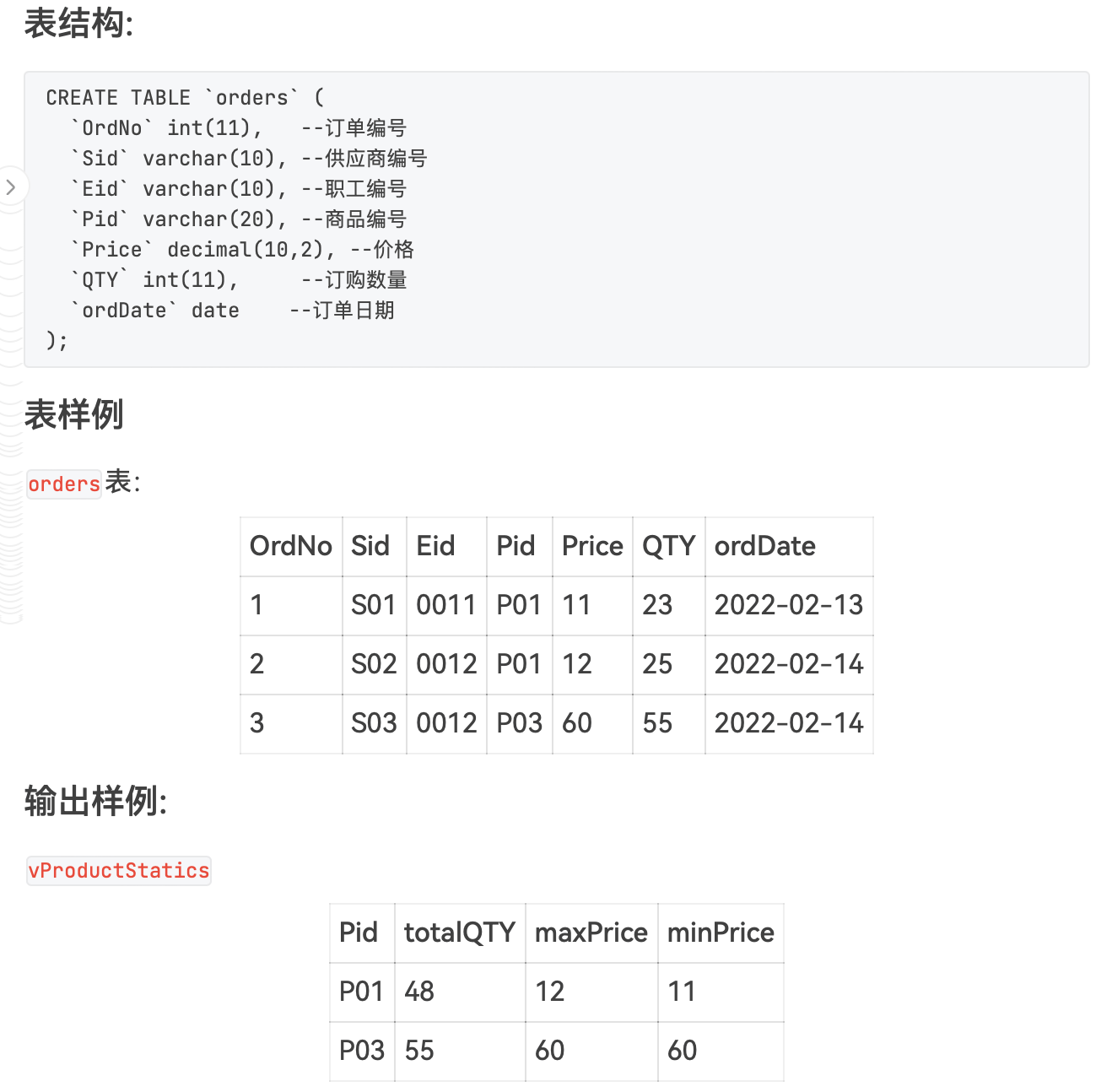
create view vProductStatics as
select Pid, sum(QTY) totalQTY, max(Price) maxPrice, min(Price) minPrice
from orders
group by Pid;